#henrik pontoppidan
Text

'Portrait of Henrik Pontoppidan (1857-1943)' as painted circa 1908 by Peder Severin Kroyer (1851-1909). I like the sitter's grey bits...
18 notes
·
View notes
Text
"If it is correct that the way to Hell is paved with good intentions, so the path to Heaven necessarily must be paved with our worst. There is more truth in that than can be seen at first glance. For, as is well known, the body's march through life is continually interrupted by falls; so, too, our soul's development towards fulfillment is a constant fall through sin, from which we are raised by an instinctively active self-preserving power of divine origin."
— Lykke-Per, Henrik Pontoppidan (trans. Naomi Lebowitz)
5 notes
·
View notes
Text
Books of 2023
At the end of the year, I look through my diary where I note down the books, I have read this year and gather them in a list. I read quite a lot (this year, I’ve read 57 books) – naturally, some are better than others. Here are my favorites from 2023.
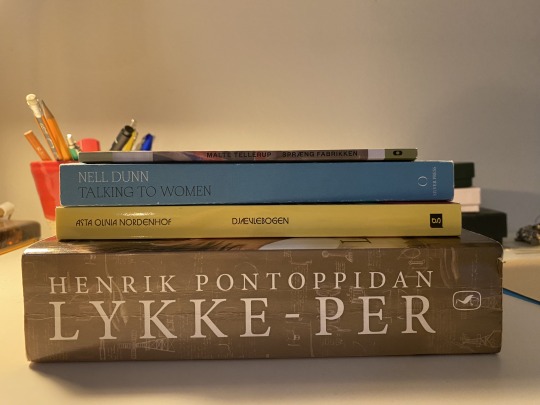
Some of the books but not all because this year, I borrowed a lot of books from the library and from my friends who all have great taste.
Janet Malcolm: In the Freud archives (1984) and The journalist and the murderer (1989)
I’ve been introduced to many of my favorite authors by my friend Nanna, who in the beginning of this year lent me In the Freud archives, a journalistic encounter of a conflict in the psychoanalytic milieu in New York about Freud’s legacy, more specifically, about Freud’s relation to the seduction theory. The book reads like a crime novel while also asking fundamental psychoanalytic questions. Why does it matter so much what Freud thought about the seduction theory, I thought to myself at the beginning of the book. Quite a lot, it turns out. The journalist and the murderer changed the way I think about interviewing and representations, and I think everyone who works with written representations of people should read this. I’ve been schooled in thinking about ethnographic representations through a political and decolonial lens but The journalist made me think about it through psychoanalytical terms as well – the impossibility of representing others reflect the impossibility of knowing yourself fully.
Nell Dunn: Talking to women (1964)
I finished this book in January when I was on a writing retreat in Skagen at an old refugium. Outside, it was cold and windy, the days were short, I sat inside by my desk, attempting to finish an article. At night in bed, I read Talking to women, a collection of interviews Dunn made with women she knew about love, work, motherhood – in other words, about life. Although the interviews are from the early ‘60s, they convey recognizable aspects of womanhood, both the pleasures and the pain. Dunn’s interview isn’t the detached style of a journalist or a sociologist but that of a friend: she intervenes, discusses, comforts her subjects, resulting in the interviews also demonstrating female friendships.
Elena Ferrante: Days of abandonment (2002)
This is the first Ferrante book I’ve read outside of the Neapolitan quartet. I think it’s one of the bravest books I’ve read about what love can do to you – I’ve written about the book’s qualities in another blogpost, so I won’t say much more about it, just that it shook me deeply with its painful depictions of betrayal, disappointment, and jealousy.
Henrik Pontoppidan: Lykke-Per (1898-1904)
My stepmum gifted me this book years ago but I’ve never gotten around to reading it until this summer, expecting it to be one of those boring classics you are forced to analyze in Danish class. I never heard much about it what it is actually about: the story’s hero, Lykke-Per, grows up the son of a very conservative priest in Western Jutland but early on rejects his family’s way of living, and decides to move to Copenhagen and study engineering. Here, he befriends several members of the establishment, makes great engineering plans for Denmark, and tries to marry into the bourgeoise and leave his background for good. However, in my opinion, the real hero of the book is Per’s fiancé, Jakobe, the extremely intelligent daughter of a wealthy Jewish family who’s trying to find her way in the man-dominated world she feels uncomfortable in. It's a book both about the modernization of Denmark, as well as an existential story about getting what you want and then not wanting it, about human relationships, about antisemitism, about women’s struggles and a page turner? I think I’ll return to this book in the future.
Fleur Jaeggy: Sweet days of discipline (1991)
I love ominous books about communities of girls and women, and this was no exception. It takes place in a Swiss boarding school and is written in the first person, but the narrator remains elusive, impossible to grasp outside of the group of women. “When you’re in boarding school you imagine how grand and free the world is, and when you leave, you’d sometimes like to hear the sound of the school bell again”. More Fleur Jaeggy in 2024!
Malte Tellerup: Spræng fabrikken (2023)
I couldn’t stop 1) thinking about this book and 2) telling everyone who would listen about it. It’s a very short book which a reviewer called ‘anti-literature’ – it’s about three young people living on a small farm where they experiment with regenerative agriculture when they are told that they will have to leave the land due to the neighboring chemical factory expanding. They give up their farming and instead start making bombs for attacking the factory. I’m planning on writing a separate post on this book, so I won’t say much more other than this being the best piece of ‘climate literature’ I have read.
Asta Olivia Nordenhof: Djævlebogen (2023)
Nordenhof was maybe the first contemporary author I read who demonstrated how literature can be political and personal at the same time with her poetry book “det nemme og det ensomme” (the easiness and the loneliness). I’ve longed for this book, the second in a planned septology, since she published the first one in 2020 and read it in one setting. It’s about the possibility of love under capitalism, about money, sex work, strange encounters and mixes the novel with poetry. Here’s (a badly translated) part of the poem which makes up the introduction in which she describes her troubles with writing the book:
“my motto/which I had forgotten/while I was struggling/to write a/real book/about the inner life of great men/my motto/here it is/it is simple/and great/fuck men!/when I remembered this/I remembered/that I can do/what I want.”
Natalia Ginzburg: All our yesterdays (1952)
Sally Rooney described this as a perfect novel, and I would agree. It’s about a family living in fascist Italy with the youngest girl of the family as the protagonist who however doesn’t take up more space in the novel than the rest of its characters which the novel follows through the Second World War as some of them join the resistance and others find other ways to cope with fascism. The novel explores the impact fascism and war have on different people, without viewing this as a reflection of essential character traits or depicting some as inherently evil and others as inherently good. Ginzburg has an eye for the small things that make up people – certain turns of phrases, bodily manners, temperaments – and the necessarily ever-changing relationships between them, writing about these with great feeling and humour. I enjoyed the way the novel treats politics and politicization not primarily through public life, but in the personal relationships of the characters.
I’m quite satisfied that only one (!) US-American author made it onto this list. Next year, I’d like to read more authors from the Global South and perhaps even more POETRY. I also want to continue reading the same books as my friends because literature is, truly, best when discussed with others. Until then, I’m off to buy champagne and lemons for New Year’s Eve – see you!
#feminist literature#elena ferrante#natalia ginzburg#henrik pontoppidan#asta olivia nordenhof#fleur jaeggy#contemporary literature
0 notes
Text
"In the years after the Directorate of the State Mental Hospitals was set up, interference by the National Board of Health was not the psychiatrists’ biggest concern—in fact, some decades later, the chief physicians had to appeal to the Board of Health to engage more directly with the Directorate’s work. Rather, the main problem was the head of the Directorate himself, Georg Brøchner-Mortensen, a former inspector of the Copenhagen prison, Vestre Fængsel. He ended up at the helm of the organisation for 30 years, during which time—according to many disgruntled psychiatrists—he kept the state hospitals on a very short leash.
At first, however, there were few open expressions of dissatisfaction with Brøchner-Mortensen, largely because both the director and the psychiatrists had so much else to do. The first major task was dealing with the aftermath of the “reunification of Denmark”—or partition of Schleswig—in 1920. As part of the Treaty of Versailles after World War I, the rural areas in Northern Schleswig were returned to Denmark from Germany. On 11 July, hundreds of thousands of Danes thronged the streets, singing patriotic songs, cheering loudly and toasting the expansion of the kingdom.
The mood in the Directorate of the State Mental Hospitals was less euphoric. For the Directorate, Northern Schleswig did not return like “the apple of a mother’s eye, in the dawn of a new era,” as the author Henrik Pontoppidan put it in his poem to mark the occasion. Rather, it was a burden—a problem that required a swift solution. This new part of the country did not have a mental hospital, and new institutions were needed. To compound matters, many young men from the area had fought on the German side in the war and witnessed unimaginable carnage in the muddy trenches. Troops from North Schleswig had been deployed on the Eastern and Western fronts, done some of the worst jobs and fought in the bloodiest battles, at the Somme and Verdun. In total, 30,000 Danish-speaking troops from North Schleswig fought in the war. About 6,000 were left as invalids, and the Danish government assumed responsibility for their care in December 1920.
A large number of veterans were classified as suffering from mental disorders brought on by their experiences during the war. Some were admitted to the hospital in Viborg, along with Middelfart and Aarhus, the closest institutions to South Jutland. However, the distances involved were still considerable—South Jutland was over 100 km from Middelfart and more than 200 km from Viborg and Aarhus. Journeys of that length were often an insurmountable obstacle for families who wanted to visit patients."
- Jesper Vaczy Kragh, Lobotomy Nation: The History of Psychosurgery and Psychiatry in Denmark (Springer: 2021) p. 37-38.
#directorate of the state mental hospitals#mental hospital#aarhus#viborg#psychiatric clinic#psychiatric power#danish history#madness and civilization#lobotomy nation#academic quote#reading 2023#history of mental illness#schleswig holstein#treaty of versailles#war wounded#shell shocked
0 notes
Text
Pilgrim Kamanita - A Legendary Romance - by Karl Gjellerup
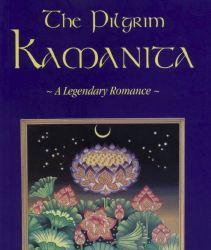
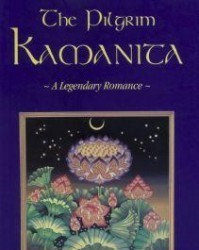
Pilgrim Kamanita – A Legendary Romance
Pilgrim Kamanita - A Legendary Romance. In 1917, the two Danish authors Karl Gjellerup and Henrik Pontoppidan shared the Nobel Prize in Literature. Karl Gjellerup is the least known but wrote some fantastic works on diverse subjects. He wrote in German and here is a surprising work of literature he wrote on Buddhism. It is about the journey of Kamanita, an Indian merchant's son, from earthly prosperity and sensual romance, till his meeting with a stranger monk who is Gautama Buddha. In Thailand, The Pilgrim Kamanita is on the school programme. The Pilgrim Kāmanīta’ was published in German in 1906, 16 years before Hermann Hesse published his similar and much more well-known novel Siddartha. This version of The Pilgrim Kamanita is published and edited by Amaro Bhikkhu as a dedication when the Amaravati Buddhist Monastery opened in 1999.
Download the work here (28,3 MB/540 pages):

Pilgrim Kamanita by Karl Gjellerup
You can buy the print version here: Link
Pilgrim Kamanita – A Legendary Romance: An Overview
"Pilgrim Kamanita – A Legendary Romance" is a captivating novel by Nobel Prize-winning Danish author Karl Gjellerup. Set against the backdrop of ancient India, this tale is a profound exploration of love, karma, rebirth, and the teachings of Buddhism.
The Enchanting Encounter
The narrative unfolds with Kamanita, the son of a prosperous merchant, encountering the mesmerizing Vasitthi during a festive celebration—their instant connection and deep-seated love for each other form the crux of the story. However, fate has other plans, and the two lovers are separated by circumstances beyond their control.
Trials, Tribulations, and Teachings
As the story progresses, both Kamanita and Vasitthi navigate a series of challenges. Their journeys are not just physical but also spiritual, as they grapple with the consequences of their past actions, or karma. The teachings of the Buddha play a pivotal role in the narrative, offering insights into the nature of existence, the cycle of rebirth, and the path to enlightenment.
Kamanita's Spiritual Odyssey
A significant portion of the novel is dedicated to Kamanita's spiritual evolution. Following his demise, his virtuous deeds earn him a place in one of the heavenly realms. Yet, even in paradise, he remains tormented by the absence of Vasitthi. His relentless quest for her and his encounters in the celestial realm provide readers with a deep understanding of Buddhist concepts of life, death, and the afterlife.
Conclusion
"Pilgrim Kamanita – A Legendary Romance" is more than just a love story. It's a philosophical exploration of life's deeper meanings, intertwined with the teachings of Buddhism. Gjellerup's masterful storytelling and profound insights into human nature make this novel a must-read for those seeking both romance and spiritual enlightenment.
Read the full article
0 notes
Text
Efemérides literarias: 24 de julio
Nacimientos
1621: Jan Andrzej Morsztyn, poeta y escritor polaco (f. 1693).
1802: Alejandro Dumas, padre, novelista y dramaturgo francés (f. 1870).
1831: Juan Antonio Mateos, dramaturgo, novelista, poeta, periodista y político mexicano (f. 1913).
1857: Henrik Pontoppidan, escritor danés, premio nobel de literatura en 1917 (f. 1943).
1867ː Consuelo Álvarez Pool, Violeta, telegrafista,…

View On WordPress
0 notes
Text
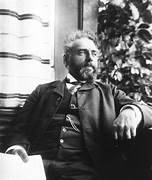
Alredered Remembers Danish writer and 1917 Literature Nobelist Henrik Pontoppidan, on his birthdeay.
"After a summer trip to Switzerland, which was rich in experiences, I started writing. In the beginning, I aimed at descriptions of nature and folk life until, as the years passed, the description of man became my chief interest. " -Henrik Pontoppidan
0 notes
Text
Birthdays 7.24
Beer Birthdays
Jacob Woolner (1834)
Charles F. Russert (1861)
Adolf Bremer (1869)
John Harris (1963)
Barb Miller
Five Favorite Birthdays
Willie Davis; Green Bay Packers DE (1934)
Amelia Earhart; aviator (1937)
Summer Glau; actor (1981)
Alphonse Mucha; Czech artist (1860)
Gus Van Sant; film director (1952)
Famous Birthdays
Bella Abzug; politician(1920)
E.F. Benson; writer (1867)
Ernest Bloch; composer (1880)
SImon Bolivar; South American liberator (1783)
Barry Bonds; San Francisco Giants LF (1964)
Ruth Buzzi; comedian (1936)
Rose Byrne; Australian actor (1979)
Lynda Carter; actor (1951)
Kristin Chenoweth; singer, actor (1968)
Alexandre Dumas; French writer (1802)
Jon Faddis; jazz trumpeter (1953)
Zelda Fitzgerald; writer (1900)
Gallagher; comedian (1947)
Gauge; porn actor (1980)
Robert Graves; English writer (1895)
Robert Hays; actor (1947)
Dan Hedaya; actor (1940)
Laura Leighton; actor (1968)
Jennifer Lopez; singer, actor (1970)
John MacDonald; writer (1916)
Karl Malone; Utah Jazz F (1963)
Pat Oliphant; cartoonist (1935)
Anna Paquin; actor (1982)
Henrik Pontoppidan; Danish writer (1857)
Teagan Presley; porn actor (1985)
Michael Richards; comedian, actor (1949)
Chris Sarandon; actor (1942)
Billy Taylor; jazz pianist (1921)
Pam Tillis; country singer (1957)
Frank Wedekind; German playwright (1864)
Cootie Williams; jazz trumpeter (1910)
Peter Yates; English film director (1929)
0 notes
Text
1901 Sully-Prudhomme.jpg シュリ・プリュドム
(1839 – 1907) フランス第三共和政の旗 フランス フランス語 高尚な理想主義と芸術的完成度、心情と知性を組み合わせた詩的な著作に対して[17] 詩、随筆
1902 T-mommsen-2.jpg テオドール・モムゼン
(1817 – 1903) ドイツの旗 ドイツ ドイツ語 特筆すべき著作"ローマ史"を代表作として、存命中の歴史の著作家の中では最大の巨匠であること[18] 歴史、法律
1903 Portrett av Bjørnstjerne Bjørnson, 1909 - no-nb digifoto 20150129 00043 bldsa BB0791 - Restoration.jpg ビョルンスティエルネ・ビョルンソン
(1832 – 1910) ノルウェーの旗 ノルウェー ノルウェー語 新たな感性と精神の希少な純度の両方において高名であり、高貴で壮大、且つ多彩な詩に敬意を表して[19] 詩、小説、戯曲
1904 Frederic Mistral portrait photo.jpg フレデリック・ミストラル
(1830 – 1914) フランス第三共和政の旗 フランス プロヴァンス語 プロヴァンスの言語学者としての重要な業績の他、自然景観と人々の土着の精神を忠実に反映した、彼の詩作の新鮮な独創性と真の触発に対して[20] 詩、哲学
José Echegaray y Eizaguirre.jpg ホセ・エチェガライ・イ・アイサギレ
(1830 – 1914) スペインの旗 スペイン スペイン語 独創的で個性的な手法でスペインの戯曲の偉大な伝統を復活させた、数多くの鮮やかな著作に対して"[20] 戯曲
1905 Henryk Sienkiewicz 1905.jpg ヘンリク・シェンキェヴィチ
(1846 – 1916) ポーランドの旗 ポーランド
(ロシア帝国の旗 ロシア帝国) ポーランド語 叙事詩作家としての顕著な功績に対して[21] 小説
1906 Giosuè Carducci2.jpg ジョズエ・カルドゥッチ
(1835 – 1907) イタリア王国の旗 イタリア イタリア語 入念な学究とその成果を評価するとともに、創造的なエネルギー、スタイルの新鮮さ、詩的な傑作を特徴づける叙情的な力に敬意を表して[22] 詩
1907 Rudyard Kipling (portrait).jpg ラドヤード・キップリング
(1865 – 1936) イギリスの旗 イギリス 英語 世界的に有名な作家の創作を特徴づける観察力、想像力の独創性、発想の意欲と、叙情の非凡な才能に対して[23] 小説、短編小説、詩
1908 Eucken-im-Alter.png ルドルフ・クリストフ・オイケン
(1846 – 1926) ドイツの旗 ドイツ ドイツ語 真実のための本格的検索、思考の一貫した力、視野の広さ、表現の暖かさと強さによって、数多くの作品の中で人生の理想主義的哲学を実���したこと[24] 哲学
1909 Selma Lagerlöf.jpg セルマ・ラーゲルレーヴ
(1858 – 1940) スウェーデンの旗 スウェーデン スウェーデン語 その著作を特徴付ける崇高な理想主義、生気溢れる想像力、精神性の認識を称えて[25] 小説、短編小説
1910年代
編集
年 写真 受賞者 国 言語 受賞理由 ジャンル
1910 Paul Heyse 1910.jpg パウル・フォン・ハイゼ
(1830 – 1914) ドイツ ドイツ語 叙情詩人、作家そして世界的に知られた短編小説家としての長年の創作活動を通して世に送り出してきた、無上の芸術性、理想主義の浸透を賞賛して[26] 詩、戯曲、小説、短編小説
1911 Maurice Maeterlinck's Portrait.jpg モーリス・メーテルリンク
(1862 – 1949) ベルギー フランス語 多岐にわたる文学活動、特に戯曲の数々を評価して。また、豊かな想像力と詩的な空想は、時に御伽話の形を装いながらも、それぞれの作品が神秘的で読者ひとりひとりの感性に訴え想像力を刺激し、深い創造的発想を与えた[27] 戯曲、詩、随筆
1912 Gerhart Hauptmann nobel.jpg ゲアハルト・ハウプトマン
(1862 – 1949) ドイツ ドイツ語 主に戯曲の分野での豊饒で多様、且つ顕著な功績に対して[28] 戯曲, 小説
1913 Tagore3.jpg ラビンドラナート・タゴール
(1861 – 1941) インド
( イギリス帝国) ベンガル語および英語 西洋文学の一角をなす英語で思考し表現された、至極の技巧による彼の深く敏感な、鮮やかで美しい韻文に対して[29] 詩、小説、戯曲、短編小説、音楽、随筆、哲学、文芸批評、翻訳
1914 受賞者なし
1915 Romain Rolland 1915.jpg ロマン・ロラン
(1866 – 1940) フランス フランス語 文学活動の高尚な理想主義に、人類の異なるタイプを描写した思いやりと真の慈愛に、敬意を表して[12] 小説
1916 Verner von Heidenstam in the 1890s.jpg ヴェルネル・フォン・ヘイデンスタム
(1859 – 1940) スウェーデン スウェーデン語 文学における新時代を率先的に代表する者としての重要性を認めて[30] 詩、小説
1917 Karl Gjellerup.jpg カール・ギェレルプ
(1857 – 1919) デンマーク デンマーク語およびドイツ語 崇高な理想に触発された、多様で豊かな詩に対して[31] 詩
Henrik Pontoppidan 1917.jpg ヘンリク・ポントピダン
(1857 – 1943) デンマーク デンマーク語 "デンマークの現代の生活の本格的な描写に対して[31] 小説
1918 受賞者なし
1919 Carl Spitteler 1919.jpg カール・シュピッテラー
(1845 – 1924) スイス ドイツ語 叙事詩"オリュンピアの春"に対して[32] 詩
1920年代
編集
年 写真 受賞者 国 言語 受賞理由 ジャンル
1920 Hamsun bldsa HA0341.jpg クヌート・ハムスン
(1859 – 1952) ノルウェーの旗 ノルウェー ノルウェー語 代表的著作"土地の成長"に対して[33] 小説
1921 Anatole France 1893.jpg アナトール・フランス
(1844 – 1924) フランス第三共和政の旗 フランス フランス語 格調高い様式、人類への深い共感、優美さ、真なるガリア人気質からなる作風による、文学上の輝かしい功績によって[34] 小説、詩
1922 Jacinto Benavente y Martinez.jpg ハシント・ベナベンテ
(1866 – 1954) スペインの旗 スペイン スペイン語 スペインの戯曲の輝かしい伝統を継承する、幸福な手法に対して[35] 戯曲
1923 Yeats1923.jpg ウィリアム・バトラー・イェイツ
(1865 – 1939) アイルランドの旗 アイルランド 英語 芸術性が高く精妙な詩歌によって国民全体の精神を表現した貢献に対して[36] 詩
1924 Wladyslaw Reymont 1924.jpg ヴワディスワフ・レイモント
(1867 – 1925) ポーランドの旗 ポーランド ポーランド語 偉大なる国民的叙事詩"農民"に対して[37] 小説
1925 George Bernard Shaw 1934-12-06.jpg ジョージ・バーナード・ショー
(1856 – 1950) イギリスの旗 イギリス
アイルランドの旗 アイルランド[38]
(アイルランド生まれ) 英語 他に類を見ない風刺に満ち、理想性と人間性を描いた作品を送り出した事に対して[39] 戯曲、文芸評論
1926 Grazia Deledda 1926.jpg グラツィア・デレッダ
(1871 – 1936) イタリア王国の旗 イタリア イタリア語 生まれ故郷の島での生活と人間の一般的な問題を深く人工的に明快に描写した、理想的な天来の著作に対して[40] 詩、小説
1927 Bergson-Nobel-photo.jpg アンリ・ベルクソン
(1859 – 1941) フランスの旗 フランス フランス語 豊かで活発な発想と、それが表現された鮮やかな技巧に対して[41] 哲学
1928 Sigrid Undset 1928.jpg シグリ・ウンセット
(1882 – 1949) ノルウェーの旗 ノルウェー
(デンマーク生まれ) ノルウェー語 中世北欧の生活についての力強い著述に対して[42] 小説
1929 Thomas Mann 1929.jpg トーマス・マン
(1875 – 1955) ドイツの旗 ドイツ ドイツ語 現代の古典としての認識を広く得た傑作『ブッデンブローク家の人々』に対して[43] 小説、短編小説、随筆
1930年代
編集
年 写真 受賞者 国 言語 受賞理由 ジャンル
1930 Sinclair Lewis 1930.jpg シンクレア・ルイス
(1885 – 1951) アメリカ合衆国の旗 アメリカ 英語 活き活きとした写実的な描写技術および機智とユーモアを伴った、新しいタイプの人物を造形する能力に対して[44] 小説、短編、戯曲
1931 Erik Axel Karlfeldt 1931.jpg エリク・アクセル・カールフェルト
(1864 – 1931) スウェーデンの旗 スウェーデン スウェーデン語 エリク・アクセル・カールフェルトの詩に対して[45] 詩
1932 John Galsworthy 2.jpg ジョン・ゴールズワージー
(1867 – 1933) イギリスの旗 イギリス 英語 "フォーサイト物語"で頂点を極めた、優れた物語の芸術に対して[46] 小説
1933 Ivan Bunin 1933.jpg イヴァン・ブーニン
(1870 – 1953) ロシアの旗 ロシア
(ロシア帝国生まれ) ロシア語 散文によって古典的なロシアの伝統を継承した厳格な芸術に対して[47] 短編小説、詩、小説
1934 Luigi Pirandello 1932.jpg ルイジ・ピランデルロ
(1867 – 1936) イタリアの旗 イタリア イタリア語 劇的且つ美しい芸術を、大胆且つ独創的に復活させたこと[48] 戯曲、小説、短編小説
1935 受賞者なし
1936 Eugene O'Neill 1936.jpg ユージン・オニール
(1888 – 1953) アメリカ合衆国の旗 アメリカ 英語 悲劇の独創的な概念を具現化する、彼の戯曲の力強さ、誠実的さ、深い感情に対して[49] 戯曲
1937 Roger Martin du Gard 1937.jpg ロジェ・マルタン・デュ・ガール
(1881 – 1958) フランス第三共和政の旗 フランス フランス語 "チボー家の人々"で、現代の生活のいくつかの基本的な側面のみならず、人間の葛藤を描いた芸術の力と真実に対して[50] 小説
1938 Pearl Buck (Nobel).jpg パール・S・バック (1892 – 1973) アメリカ合衆国の旗 アメリカ 英語 中国での農民の生活について豊かで壮大な描写と彼女の伝記の傑作を評価して[51] 小説、伝記
1939 FransEemilSillanpää.jpg フランス・エーミル・シランペー
(1888 – 1964) フィンランドの旗 フィンランド フィンランド語 祖国の農民階層に対する深い理解と彼らの生き方と、自然との関係を描いた高い技術に対して[52] 小説
1940年代
編集
年 写真 受賞者 国 言語 受賞理由 ジャンル
1940 受賞者なし
1941 受賞者なし
1942 受賞者なし
1943 受賞者なし
1944 Johannes Vilhelm Jensen 1944.jpg ヨハネス・ヴィルヘルム・イェンセン
(1873 – 1950) デンマーク デンマーク語 広い視野の知的好奇心と大胆で新鮮な創造的スタイルに結びつけられた、彼の詩的想像力の類稀なる強さと豊かさに対して[53] 小説、短編小説
1945 Gabriela Mistral 1945.jpg ガブリエラ・ミストラル
(1889 – 1957) チリ スペイン語 力強い動機に触発された抒情詩によって、彼女の名が全ラテンアメリカ世界の理想主義的な願望の象徴と化したこと[54] 詩
1946 Hermann Hesse 1946.jpg ヘルマン・ヘッセ
(1877 – 1962) ドイツ
スイス
(ドイツ生まれ) ドイツ語 古典的な博愛家の理想と上質な文章を例示する、大胆さと洞察の中で育まれた豊かな筆業に対して[55] 小説、詩
1947 André Gide.jpg アンドレ・ジッド
(1869 – 1951) フランス フランス語 人間の問題や状況を、真の大胆不敵な愛と鋭い心理洞察力で表現した、包括的で芸術的に重要な著作に対して[56] 小説、随筆
1948 TS Eliot.jpg T・S・エリオット
(1888 – 1965) イギリス
(アメリカ生まれ) 英語 詩文学への卓越した貢献に対して[57] 詩
1949 Carl Van Vechten - William Faulkner (greyscale and cropped).jpg ウィリアム・フォークナー
(1897 – 1962) アメリカ 英語 アメリカの現代小説に対する、強力かつ独創的な貢献に対して[13] 小説、短編小説
1950年代
編集
年 写真 受賞者 国 言語 受賞理由 ジャンル
1950 Bertrand Russell 1957.jpg バートランド・ラッセル
(1872 – 1970) イギリスの旗 イギリス 英語 人道的理想や思想の自由を尊重する、彼の多様で顕著な著作群を表彰して[58] 哲学
1951 Lagerkvist.jpg ペール・ラーゲルクヴィスト
(1891 – 1974) スウェーデンの旗 スウェーデン スウェーデン語 人類が直面する永遠の課題に対し詩作により解を探ろうと試みる芸術的活力と真の意味での精神的自立に対して[59] 詩、小説、短編小説、戯曲
1952 François Mauriac 1952.jpg フランソワ・モーリアック
(1885 – 1970) フランスの旗 フランス フランス語 小説の人間生活のドラマに浸透した、深い精神的な洞察力と芸術的な強さに対して[60] 小説、短編小説
1953 Winston Churchill cph.3a49758.jpg ウィンストン・チャーチル
(1874 – 1965) イギリスの旗 イギリス 英語 "歴史や伝記の記述の熟達に加え、高揚した人間の価値についての雄弁な庇護者であること[61] 歴史、随筆、回想録
1954 Ernest Hemingway 1950 crop.jpg アーネスト・ヘミングウェイ
(1899 – 1961) アメリカ合衆国の旗 アメリカ 英語 "老人と海"に代表される、叙述の芸術への熟達と、現代のストーリーテリングの形式に及ぼした影響に対して[62] 小説、短編小説、脚本
1955 Halldór Kiljan Laxness 1955.jpg ハルドル・ラクスネス
(1902 – 1998) アイスランドの旗 アイスランド アイスランド語 アイスランドの偉大な物語の芸術を革新した、彼の鮮やかで壮大な力に対して[63] 小説、短編小説、戯曲、詩
1956 JRJimenez.JPG フアン・ラモン・ヒメネス
(1881 – 1958) スペインの旗 スペイン スペイン語 高邁な精神と芸術的純度の一例を構成する、スペイン語による彼の叙情的な詩に対して[64] 詩
1957 Camus Harcourt 1945.jpg アルベール・カミュ
(1913 – 1960) フランスの旗 フランス
(フランス領アルジェリア生まれ) フランス語 この時代における人類の道義心に関する問題点を、明確な視点から誠実に照らし出した、彼の重要な文学的創作活動に対して[65] 小説、短編小説、戯曲、哲学、随筆
1958 Boris Pasternak 1969.jpg ボリス・パステルナーク
(1890 – 1960) ソビエト連邦の旗 ソビエト連邦 ロシア語 叙情的な詩、および大ロシアの歴史的伝統に関する分野における、彼の重要な功績に対して[66] 小説、詩、翻訳
1959 Salvatore Quasimodo 1959.jpg サルヴァトーレ・クァジモド
(1890 – 1960) イタリアの旗 イタリア イタリア語 古典的な火で現代の生活の悲劇的な経験を照らし出す、叙情的な詩に対して[67] 詩
1960年代
編集
年 写真 受賞者 国 言語 受賞理由 ジャンル
1960 Saint-John Perse 1960.jpg サン=ジョン・ペルス
(1887 – 1975) フランスの旗 フランス
(グアドループ生まれ) フランス語 我々の時代の状況を先見的に反映した、彼の詩の高らかな飛翔と喚情的な形象に対して[68] 詩
1961 S. Kragujevic, Ivo Andric, 1961.jpg イヴォ・アンドリッチ
(1892 – 1975) ユーゴスラビアの旗 ユーゴスラビア
(オーストリア、ハンガリー生まれ) セルビア・クロアチア語 自国の歴史の主題と人間の運命を描いた、彼の偉大な力量に対して[69] 小説、短編小説
1962 John Steinbeck 1939 (cropped).jpg ジョン・スタインベック
(1902 – 1968) アメリカ合衆国の旗 アメリカ 英語 "優れた思いやりのあるユーモアと鋭い社会観察を結びつけた、現実的で想像力のある著作に対して
[70]
小説、短編小説、脚本
1963 Giorgos Seferis 1963.jpg イオルゴス・セフェリス
(1900 – 1971) ギリシャ王国の旗 ギリシャ王国
(オスマン帝国生まれ) ギリシャ語 ヘレネの世界観への深い感情から着想を得た、優れた詩作に対して[71] 詩、随筆、回想録
1964 Jean Paul Sartre 1965.jpg ジャン=ポール・サルトル
(1905 – 1980) フランスの旗 フランス フランス語 アイデアが豊富で、自由の精神と真実の探求に満ちた作品は広範囲にわたる影響を及ぼしたため[72] 小説、短編小説、哲学、戯曲、文芸評論、脚本
1965 Mikhail Sholokhov 1960.jpg ミハイル・ショーロホフ
(1905 – 1984) ソビエト連邦の旗 ソビエト連邦 ロシア語 ロシアの人々の生活の歴史的な段階を表現した芸術の力と整合性に対して[73] 小説
1966 Agnon.jpg シュムエル・アグノン
(1888 – 1970) イスラエルの旗 イスラエル
(ハンガリー生まれ) ヘブライ語 ユダヤ人の人々の生活をモチーフにした深遠に個性的な叙述の芸術に対して[74] 小説、短編小説
Nelly Sachs 1966.jpg ネリー・ザックス
(1891 – 1970) ドイツの旗 ドイツ
スウェーデンの旗 スウェーデン
(ドイツ生まれ) ドイツ語 イスラエルの運命を伝える優れた詩と劇作に対して[74] 詩、戯曲
1967 Miguel Angel Asturias.jpg ミゲル・アンヘル・アストゥリアス
(1899 – 1974) グアテマラの旗 グアテマラ スペイン語 ラテンアメリカの原住民の伝統と国民性に深く根ざした鮮やかな文学的業績に対して[75] 小説、詩
1968 Yasunari Kawabata 1968 cropped.jpg 川端康成
(1899 – 1972) 日本の旗 日本 日本語 日本人の心の真髄をすぐれた感受性をもって表現し、世界の人々に深い感銘を与えたため[76] 小説、短編小説
1969 Samuel Beckett, Pic, 1 (cropped).jpg サミュエル・ベケット
(1906 – 1989) アイルランドの旗 アイルランド フランス語および英語 小説と戯曲の新たな形式の中で、現代人の悲惨を描き、その芸術的な偉業を果たした彼の作品に対して[77] 小説、戯曲、詩
1970年代
編集
年 写真 受賞者 国 言語 受賞理由 ジャンル
1970 Aleksandr Solzhenitsyn 1974crop.jpg アレクサンドル・ソルジェニーツィン
(1918 – 2008) ソビエト連邦 ロシア語 ロシア文学の不可欠な伝統を追求したその倫理的な力に対して[78] 小説
1971 Pablo Neruda 1963.jpg パブロ・ネルーダ
(1904 – 1973) チリ スペイン語 一国の大陸の運命と、多くの人々の夢に生気を与える源となった、力強い詩的作品に対して[79] 詩
1972 Heinrich Böll (1983).jpg ハインリヒ・ベル
(1917 – 1985) ドイツ ドイツ語 同時代への幅広い眺望と鋭い描写によって、ドイツ文学の刷新に貢献した[80] 小説、短編小説
1973 Patrick White 1973.jpg パトリック・ホワイト
(1912 – 1990) オーストラリア
(イギリス生まれ) 英語 文学に新大陸をもたらした叙事詩と心理的叙述の芸術に対して[81] 小説、短編小説、戯曲
1974 Eyvind.JPG エイヴィンド・ユーンソン
(1900 – 1976) スウェーデン スウェーデン語 各地域および各時代を俯瞰しつつ自由のために奉仕する語りの技法に対して[82] 小説
Harry Martinson 001.tiff ハリー・マーティンソン
(1904 – 1978) スウェーデン スウェーデン語 露のひとしずくを捉えて宇宙を映し出す作品群に対して[82] 詩、小説、戯曲
1975 Eugenio montale 2.jpg エウジェーニオ・モンターレ
(1896 – 1981) イタリア イタリア語 偉大な芸術的感性を伴い、幻想のない人生観の兆候の下で、人間の価値を解釈する独特の詩作に対して[83] 詩
1976 Saul Bellow (Herzog portrait).jpg ソール・ベロー
(1915 – 2005) アメリカ
(カナダ生まれ) 英語 人間の理解と、捉え難い現代文化の分析に対して[84] 小説、短編小説
1977 Vicentealeixandre.jpg ビセンテ・アレイクサンドレ
(1898 – 1984) スペイン スペイン語 宇宙と現代社会の中の人間の状況を照らし出すと同時に、戦時のスペイン語詩の偉大な革新を表す創造的な詩作に対して[85] 詩
1978 Dan Hadani collection (990044399930205171).jpg アイザック・バシェヴィス・シンガー
(1902 – 1991) アメリカ
ポーランド イディッシュ語 ポーランド·ユダヤ文化の伝統に根ざし、生命に普遍的な人間の条件をもたらす情熱的な文芸作品に対して[86] 小説、短編小説、回想録
1979 Odysseas Elytis 1974.jpg オデッセアス・エリティス
(1911 – 1996) ギリシャ ギリシャ語 ギリシアの伝統的背景に抗う詩作によって、感覚的な強さと知的で明確な視野を通して、現代人の自由と創造のための闘争を描いた[87] 詩、随筆
1980年代
編集
年 写真 受賞者 国 言語 受賞理由 ジャンル
1980 Czeslaw Milosz 3 ap.tif チェスワフ・ミウォシュ
(1911 – 2004)
ポーランドの旗 ポーランド ポーランド語 妥協のない明確な視野を持ち、深刻な紛争世界にある人間がさらされた状況を表明した[88] 詩、随筆
1981 Elias Canetti 2.jpg エリアス・カネッティ
(1905 – 1994) イギリスの旗 イギリス
(ブルガリア生まれ) ドイツ語 着想と芸術性に富み、幅広い視野によって書かれた著作に対して[89] 小説、戯曲、回想録、随筆
1982 Gabriel García Márquez 02.jpg ガブリエル・ガルシア=マルケス
(1927 – 2014) コロンビアの旗 コロンビア スペイン語 現実的なものと幻想的なものとを融合させて、一つの大陸の生と葛藤の実相を反映する豊かな想像力の世界を構築した[90] 小説、短編小説、脚本
1983 William Golding 1983.jpg ウィリアム・ゴールディング
(1911 – 1993) イギリスの旗 イギリス 英語 現実的な物語の芸術の明快さと多様性、神話の普遍性に満ちた小説によって、現代世界の人間が置かれた状況を照らし出したこと[91] 小説、詩、戯曲
1984 Jaroslav Seifert 1981 foto Hana Hamplová crop.jpg ヤロスラフ・サイフェルト
(1901 – 1986) チェコスロバキアの旗 チェコスロバキア
(オーストリア=ハンガリー帝国生まれ) チェコ語 新鮮さ、官能性、豊かな創意性に富んだ詩によって、不屈の精神と人間の多様性の解放的なイメージを与えたこと[92] 詩
1985 Claude Simon 1967.jpg クロード・シモン
(1913 – 2005) フランスの旗 フランス
(マダガスカル生まれ) フランス語 詩人の創造性と画家の創造性を深めた意識に結びつけ、人間の状況を描写した[93] 小説、文芸評論
1986 WoleSoyinka2015.jpg ウォーレ・ショインカ
(1934 – ) ナイジェリアの旗 ナイジェリア 英語 幅広い文化的視点と、詩的な響きによって、存在のドラマを創り上げたこと[94] 戯曲、小説、詩、脚本
1987 Joseph Brodsky 1988.jpg ヨシフ・ブロツキー
(1940 – 1996) アメリカ合衆国の旗 アメリカ
(ソビエト連邦生まれ) ロシア語および英語 思考の明快さと詩的な力強さが一体化した、包括的な作品群にたいして[95] 詩、随筆
1988 Necip Mahfuz.jpg ナギーブ・マフフーズ
(1911 – 2006) エジプトの旗 エジプト アラビア語 ニュアンスに富んだ作品群を通して、全人類に普遍性を持つアラビア語の創作芸術を形成したこと[96] 小説、短編小説
1989 Camilo José Cela Madrid 1996.jpg カミーロ・ホセ・セラ
(1916 – 2002) スペインの旗 スペイン スペイン語 人間の脆弱性の挑戦的なビジョンを形成する、自制的な憐憫を含んだ、豊穣で徹底した散文に対して[97] 小説、短編小説、随筆、詩
1990年代
編集
年 写真 受賞者 国 言語 受賞理由 ジャンル
1990 Paz0.jpg オクタビオ・パス
(1914 – 1998) メキシコの旗 メキシコ スペイン語 広い視野を持ち、���鋭的知性と人文主義的高潔さを特徴とした、情熱的な作品に対して[98] 詩、随筆、評論
1991 Nadine Gordimer 01.JPG ナディン・ゴーディマー
(1923 – 2014) 南アフリカ共和国の旗 南アフリカ 英語 彼女の壮大な叙事詩が、"アルフレッド・ノーベルの言葉"に即した、人文主義にとっての重要な利益であったこと[99] 小説、短編小説、随筆、戯曲
1992 Derek Walcott.jpg デレック・ウォルコット
(1930 – 2017) セントルシアの旗 セントルシア 英語 偉大なる明るさ、歴史的な視野に支えられた、多文化融合の産物たる詩的創作に対して[100] 詩、戯曲
1993 Toni Morrison.jpg トニ・モリスン
(1931 – 2019) アメリカ合衆国の旗 アメリカ 英語 先見的な力と詩的な重要性によって特徴付けられた小説で、アメリカの現実の重要な側面に生気を与えたこと[101] 小説
1994 Oe Kenzaburo 1-2.jpg 大江健三郎
(1935 – ) 日本の旗 日本 日本語 詩趣に富む表現力を持ち、現実と虚構が一体となった世界を創作して、読者の心に揺さぶりをかけるように現代人の苦境を浮き彫りにしている[102] 小説、短編小説、随筆、評論
1995 Seamus Heaney Photograph Edit.jpg シェイマス・ヒーニー
(1939 – 2013) アイルランドの旗 アイルランド 英語 日々の奇跡と生き生きとした過去を称える、詩的な美しさと民族的な深みを持つ作品に対して[103] 詩、戯曲、翻訳
1996 Wisława Szymborska 2009.10.23 (1).jpg ヴィスワヴァ・シンボルスカ
(1923 – 2012) ポーランドの旗 ポーランド ポーランド語 皮肉をはらんだ緻密な詩によって、人間のリアリティのフラグメントに光を当て、その歴史的、生物学的文脈を浮き彫りにした[104] 詩、随筆、翻訳
1997 DarioFo1.jpg ダリオ・フォ
(1926 – 2016) イタリアの旗 イタリア イタリア語 中世的な道化や権威を風刺し、弱者の尊厳を庇護したこと[105] 戯曲
1998 JSJoseSaramago.jpg ジョゼ・サラマーゴ
(1922 – 2010) ポルトガルの旗 ポルトガル ポルトガル語 想像、哀れみ、イロニーを盛り込んだ寓話によって我々がとらえにくい現実を描いた[106] 小説、戯曲、詩
1999 Günter Grass auf dem Blauen Sofa.jpg ギュンター・グラス
(1927 – 2015) ドイツの旗 ドイツ (グダニスク生まれ) ドイツ語 遊戯と風刺に満ちた作品により歴史の忘れられた側面を描き出した[107] 小説、戯曲、詩
2000年代
編集
年 写真 受賞者 国 言語 受賞理由 ジャンル
2000 Gao Xingjian (2012, cropped).jpg 高行健
(1940 – ) フランス (since 1998)
中国 (1940–1998) 中国語 普遍的な正当性、痛烈な洞察力、独創性をもった作品によって中国の小説や劇作に新たな道を開いたこと[108] 小説、戯曲、文芸論評
2001 VS Naipaul 2016 Dhaka (cropped).jpg V・S・ナイポール
(1932 – 2018) イギリス
(トリニダード・トバゴ生まれ) 英語 知覚的な文体と永続的な調査により仕上げられた作品によって、抑圧的な歴史の存在を直視させたこと[109] 小説、随筆
2002 Kertész Imre cropped.jpg ケルテース・イムレ
(1929 – 2016) ハンガリー ハンガリー語 人間が社会的圧力に服従している時代にあって、個人として生き、考え続ける可能性を追求した[110] 小説
2003 JM Coetzee redux.jpg J・M・クッツェー
(1940 – ) オーストラリア
南アフリカ 英語 部外者が巻き込まれていくさまを、無数の手法を用いながら意表をついた物語によって描いたこと[111] 小説、随筆、翻訳
2004 Elfriede jelinek 2004 small.jpg エルフリーデ・イェリネク
(1946 – ) オーストリア ドイツ語 社会の不条理と抑圧を並はずれた言葉への情熱を持って描き出した[112] 小説、戯曲
2005 Pinterfoto cropped2.jpg ハロルド・ピンター
(1930 – 2008) イギリス 英語 日常の対話の中に潜在する危機を晒し出し、抑圧された閉鎖空間に突破口を開いたこと[113] 戯曲、脚本
2006 Orhan Pamuk redux.jpg オルハン・パムク
(1952 – ) トルコ トルコ語 文明の衝突と混交との新たな象徴を見出した[114] 小説、脚本、自伝、随筆
2007 Doris lessing 20060312 (square).jpg ドリス・レッシング
(1919 – 2013) イギリス
ジンバブエ
(イラン生まれ) 英語 懐疑と激情、予見力をもって、対立する文明を吟味した[115] 小説、戯曲、詩、短編小説、回想録、自伝
2008 Jean-Marie Gustave Le Clézio-press conference Dec 06th, 2008-2.jpg ジャン=マリ・ギュスターヴ・ル・クレジオ
(1940 – ) フランス
モーリシャス フランス語 新たな旅立ち、詩的な冒険、官能的悦楽の書き手となって、支配的な文明を超越した人間性とその裏側を探究した[116] 詩、短編小説、随筆、翻訳
2009 Herta Müller (2019).jpg ヘルタ・ミュラー
(1953 – ) ドイツ
(ルーマニア生まれ) ドイツ語 凝縮した詩と率直な散文によって、収奪された人々の風景を描いた[117] 小説、短編小説、詩、随筆
2010年代
編集
年 写真 受賞者 国 言語 受賞理由 ジャンル
2010 Vargas Llosa Madrid 2012.jpg マリオ・バルガス・リョサ
(1936 – ) ペルー
スペイン スペイン語 権力構造の地図と、個人の抵抗と反抗、そしてその敗北を鮮烈なイメージで描いた[118] 小説、短編小説、随筆、戯曲、回想録
2011 Transtroemer.jpg トーマス・トランストロンメル
(1931 – 2015) スウェーデン スウェーデン語 稠密で透光性のあるイメージを通じて、読者に現実への斬新な道筋を与えたこと[119] 詩、翻訳
2012 MoYan Hamburg 2008.jpg 莫言
(1955 – ) 中国 中国語 幻覚的なリアリズムによって民話、歴史、現代を融合させた[120] 小説、短編小説
2013 Alice Munro.jpg アリス・マンロー
(1931 – ) カナダ 英語 現代短篇小説の名手として[121] 短編小説
2014 Patrick Modiano 6 dec 2014 - 22.jpg パトリック・モディアノ
(1945 – ) フランス フランス語 最も捉え難い人々の運命を呼び起こし、占領下の生活世界を明らかにした記憶の芸術に対して[122] 小説、脚本、戯曲
2015 Світлана Алексієвич (Київ, 2016) 08 (cropped).JPG スヴェトラーナ・アレクシエーヴィッチ
(1948 – ) ベラルーシ
(ソビエト生まれ) ロシア語 我々の時代における苦難と勇気の記念と言える叙述に対して[123] ノンフィクション、歴史、随筆
2016 Bob Dylan - Azkena Rock Festival 2010 1.jpg ボブ・ディラン
(1941 – ) アメリカ 英語 米国歌謡の伝統の中に新しい詩の表現を創造したこと [124] 詩、作詞
2017 Kazuo Ishiguro in Stockholm 2017 02.jpg カズオ・イシグロ
(1954 – ) イギリス (日本生まれ) 英語 壮大な感情の力を持った小説を通し、幻想的な世界とのつながりの感覚の下にある深淵を発見した[125] 小説、短編小説、脚本
2018 Olga Tokarczuk (2018).jpg オルガ・トカルチュク
(1962 – ) ポーランド ポーランド語 博学的な情熱によって、生き方としての越境を象徴する物語の想像力に対して[126] 小説、短編小説、詩、随筆、脚本
2019 Peter-handke.jpg ペーター・ハントケ
(1942 – ) オーストリア ドイツ語 言語の創意工夫により人間の経験の周辺と特異性を探求した影響力のある作品に対して[127] 小説、短編小説、戯曲、翻訳、脚本
2020年代
編集
年 写真 受賞者 国 言語 受賞理由 ジャンル
2020 Louise Glück circa 1977.jpg ルイーズ・グリュック
(1943 – ) アメリカ合衆国の旗 アメリカ 英語 厳粛な美しさで個人の存在を普遍的とした詩的な表現に対して[128] 詩、随筆
2021 AbulrazakGurnahHebronPanel (cropped).jpg アブドゥルラザク・グルナ
(1948 – ) タンザニアの旗 タンザニア 英語 植民地主義のもたらした影響と、異なる文化と大陸の狭間に置かれた難民が辿った運命への、妥協のない、情熱の込もった洞察に対して[129] 小説
https://ja.wikipedia.org/wiki/%E3%83%8E%E3%83%BC%E3%83%99%E3%83%AB%E6%96%87%E5%AD%A6%E8%B3%9E%E5%8F%97%E8%B3%9E%E8%80%85%E3%81%AE%E4%B8%80%E8%A6%A7
0 notes
Photo
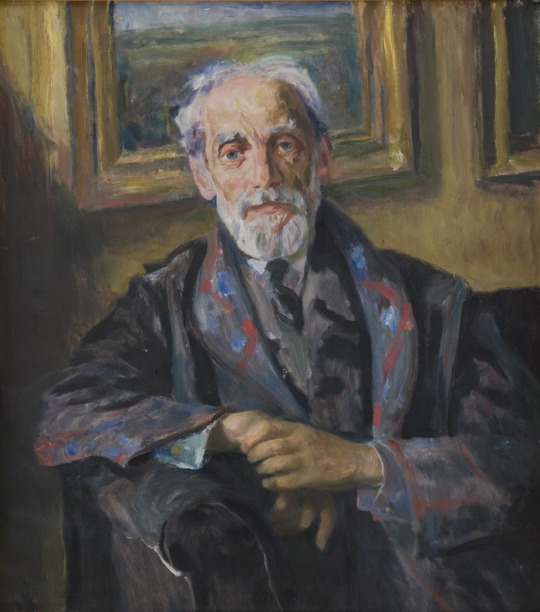
Danish painter, Sigurd Swane, was born June 16, 1879 (d. 1973). Swane studied at the Danish Royal Academy of Art, and visited Paris. Here Impressionism and esp. Fauvism had an impact on him, as evidenced by his early landscapes from Odsherred and later Skagen.
He remains a leading Danish colorist, but unlike most of his contemporaries he was not attracted to urban themes in his art, preferring rural motives. After WWII he frequently spent time in Portugal, painting landscapes and rural work scenes.
However, Swane also worked in portrait painting as in the painting above of Danish author Henrik Pontoppidan from 1933 (Statens Museum for Kunst, Ccopenhagen - oil on canvas)
#art#danish artist#sigurd swane#1930s#1940s#1920s#odsherred#skagen#odsherredmalerne#fauvism#impressionism#danish royal academy of fine arts#smk#statens museum for kunst#portrait painting#landscape painting#portugal#wwii#oil on canvas#henrik pontoppidan
20 notes
·
View notes
Photo
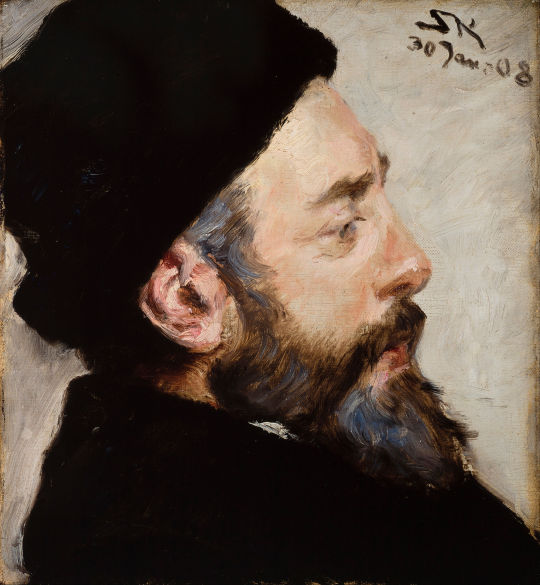
P.S. Krøyer - Henrik Pontoppidan, 1908, oil on canvas
Henrik Pontoppidan, (1857 - 1943) was a Danish writer of novels and short stories. In his later works, he explored Danish social issues with a great deal of authenticity, criticism and irony. Pontoppidan was born in Fredericia, Denmark and was the son of a priest and and educated woman. In 1873, he began studying engineering in Copenhagen. However, he stopped studying to begin work in journalism and writing in Switzerland. In 1879, he began teaching science at a village high school north of Copenhagen that were run by his brother, Mort. His first publication in 1881 was a collection of stories and he was able to support himself through writing thereafter. Pontoppidan traveled extensively in Denmark and abroad.
#P.S. Krøyer#ps kroyer#Peder Severin Krøyer#Henrik Pontoppidan#norweigian painter#skagen painter#skagen#portrait#profile#oil painting#realism#brøndum hotel#1908#1900s#danish writer#danish novelist#denmark
4 notes
·
View notes
Quote
He was drawn to her as a kind of anaesthesia to calm his mind, and he felt that only she could give him the hot and potent potion of oblivion he needed.
Lykke-Per, Henrik Pontoppidan
#literature#quotes#quote#words#lykke per#lucky per#a fortunate man#henrik pontoppidan#aesthetic#love#romance#romantic
12 notes
·
View notes
Text
Há pessoas que são atraídas pela aflição, aquelas que só encontram consolo no desespero e na solidão.
Lucky Per, Henrik Pontoppidan (1917)
54 notes
·
View notes
Photo
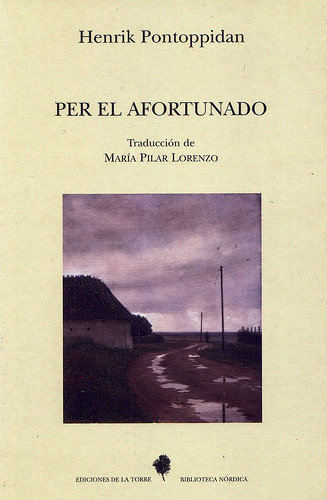
#masilvarecomienda Per el afortunado. Henrik Pontoppidan Per el afortunado es un novelón. No solo por cómo hay que ahuecar la mano para cogerlo ni por el número de páginas.
2 notes
·
View notes
Quote
Nobel Laureate Henrik Pontoppidan was born in Fredericia, Denmark on this day in 1857.
"If there really is a God, then we should seek to forget Him, to raise up men who will to do good for goodness' sake, not out of fear of punishment for their bad deeds. How can someone give alms to a poor man with a clean heart when he believes, and has an interest in believing, that there is a God who keeps score in heaven, who looks down and nods in approval?”
―from LUCKY PER (1904)
2 notes
·
View notes